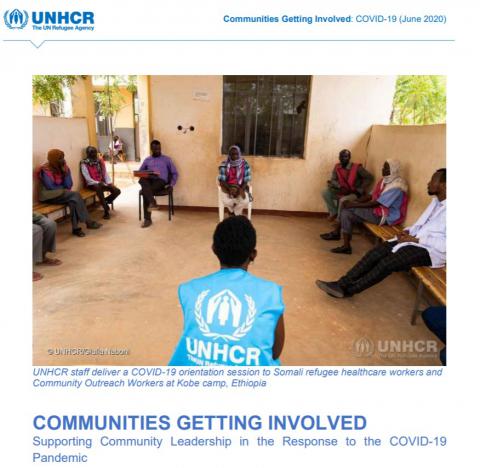Communities Getting Involved: Supporting Community Leadership in the Response to the COVID-19 Pandemic
The COVID-19 pandemic has created challenges for forcibly displaced persons and the humanitarian organizations working to support them. With restrictions on movement and limited access to refugees, asylum-seekers, internally displaced persons (IDPs) and stateless persons across the globe, UNHCR is supporting displaced communities to take the lead in the prevention of, and the response to, the existing and emerging protection needs of women, men, girls and boys of diverse backgrounds.
This brief provides an overview of UNHCRs approach to engaging communities in the prevention and response to COVID-19, and draws on examples from the field, where displaced communities are partnering with humanitarian actors to protect those at heightened risk.
Community members are the persons most knowledgeable about their own needs, and the best advisers on what approaches are suited in their local area. Every community that faces threats, engages in forms of individual or collective self-protection. If external agencies introduce new measures without considering existing ones, the community may lose its capacity to self-protect, resulting in it being worse off when external support is reduced. It is, therefore, necessary that we understand and support the strategies that communities already use, building on them and leveraging their skills and resources.
UNHCR has a history of working hand-in-hand with communities in the identification of protection needs, and jointly developing responses that build on their knowledge, capacities and resources.
UNHCR believes that meaningful participation:
• is a right, and essential for informed decision-making;
• leads to better protection outcomes and reduces feelings of powerlessness;
• enables UNHCR to draw on the insights, knowledge, capacities, skills and resources of persons of concern;
• empowers women, men, girls and boys of different backgrounds to rebuild self-esteem and self-confidence; and • helps people of concern cope with the trauma of forced displacement.
Through the regular, systematic and meaningful participation of women, men, girls and boys of diverse backgrounds, UNHCR gains a real-time understanding of how COVID-19 is impacting individuals differently, and is able to work with them to develop programmes that address these differing needs effectively.
UNHCR applies a community-based approach in its work with forcibly displaced people through which it identifies and supports community structures and establishes partnerships with community-based organizations, who play a critical role in reaching out to at-risk and marginalized groups and responding to the impacts of COVID-19. This becomes particularly important in contexts where UNHCR and partners face difficulties in accessing refugees, asylum-seekers, IDPs and stateless persons.
Read the full report here

